An alarming surge in bed bug infestations across Harare has been linked to the booming second-hand clothing trade, with residents and civic leaders raising red flags about the growing public health threat.
The outbreak began in Matererini Flats two weeks ago and has since spread rapidly to other densely populated suburbs, including Mabvuku, Kuwadzana, and Budiriro. Authorities are now under pressure to take decisive action as fears mount that the problem could engulf the entire city.
Investigations point to second-hand clothes — often stored overnight in infested apartments or transported without proper sanitation — as a major carrier of the parasites. These garments, frequently imported in bulk and traded in open-air markets or informal stalls, are thought to be arriving already contaminated or picking up the bugs while in storage.
“These clothes are the perfect Trojan horse,” said Harare mayor Jacob Mafume. “They come into our communities carrying infestations that spread like wildfire once inside residential areas. The second-hand clothes market has become a serious vector.”
Despite warnings, some informal traders continue to sell these garments without fumigation or proper handling. With vendors sometimes using already-infested residential spaces to store stock, the situation has quickly spiraled out of control.
Wisbon Malaya, secretary-general of the Zimbabwe Chamber of Informal Economy Association, urged immediate intervention: “We are encouraging traders to temporarily halt the sale of second-hand clothes until the situation is under control. The City of Harare must take the lead in fumigating homes and public spaces.”
Public transport has also been implicated in the spread, with bugs hitching rides on infested clothing and upholstery. Malaya called for all commuter vehicles to be fumigated daily until the crisis is contained.
Residents’ groups are now demanding long-overdue service delivery from the City of Harare, which they say has allowed the outbreak to flourish in neglected urban areas.
“The living conditions in places like Mbare are already dire, and this infestation just adds insult to injury,” said Reuben Akili, director of the Combined Harare Residents Association. “Authorities have been reactive instead of proactive. We warned about this years ago.”
Alice Kuveya, of the Chitungwiza Residents Trust, added that failure to address basic hygiene and service delivery has exacerbated the crisis. “The same negligence we see in garbage collection and water provision is now playing out with this bed bug infestation. The city needs to act before this turns into a national emergency.”
Mayor Mafume has promised a citywide fumigation campaign targeting all known hotspots and second-hand clothing markets. However, with the bugs already spreading through homes, buses, and markets, residents are bracing for a long battle.
Until then, experts warn, Harare’s bed bug crisis will continue to grow — one bale of clothes at a time.

For comments, Feedback and Opinions do get in touch with our editor on WhatsApp: +44 7949 297606.
